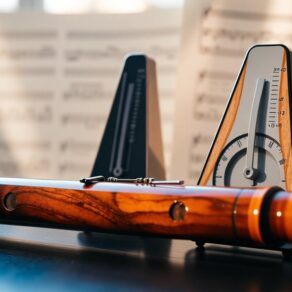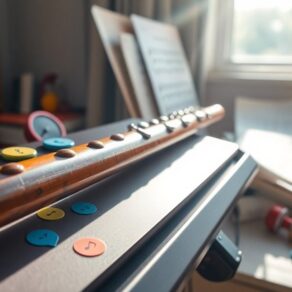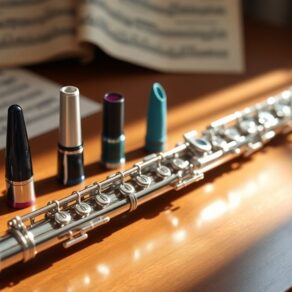If you want to elevate your flute performance, choosing the right digital tuner is key. Look for tuners that combine features like a metronome and adjustable settings for versatility. Top picks include the Snark Rechargeable Clip-On Tuner for its intuitive display and the Fender FCT-2 for its reliability. Models like the Moreup 3 in 1 also offer a tone generator, perfect for practice. Consider battery life, portability, and user-friendly designs. With the right tuner, you'll enhance your tuning and practice experience. Keep exploring to discover the best models tailored to your needs.
Key Takeaways
- Look for tuners with wide detection ranges that accurately tune flutes across various pitches, ideally covering A0 to C8.
- Choose models with user-friendly designs and large LCD screens for easy visibility during practice and performances.
- Consider digital tuners with rechargeable batteries for longer usage and automatic shut-off features to conserve battery life.
- Opt for tuners that offer multiple tuning modes specifically designed for woodwind instruments like flutes, enhancing flexibility in practice.
- Read user reviews to gauge real-world performance and satisfaction, helping identify reliable tuners for your flute.
Metronome Tuner, 3 in 1 Digital Tuner for All Instruments
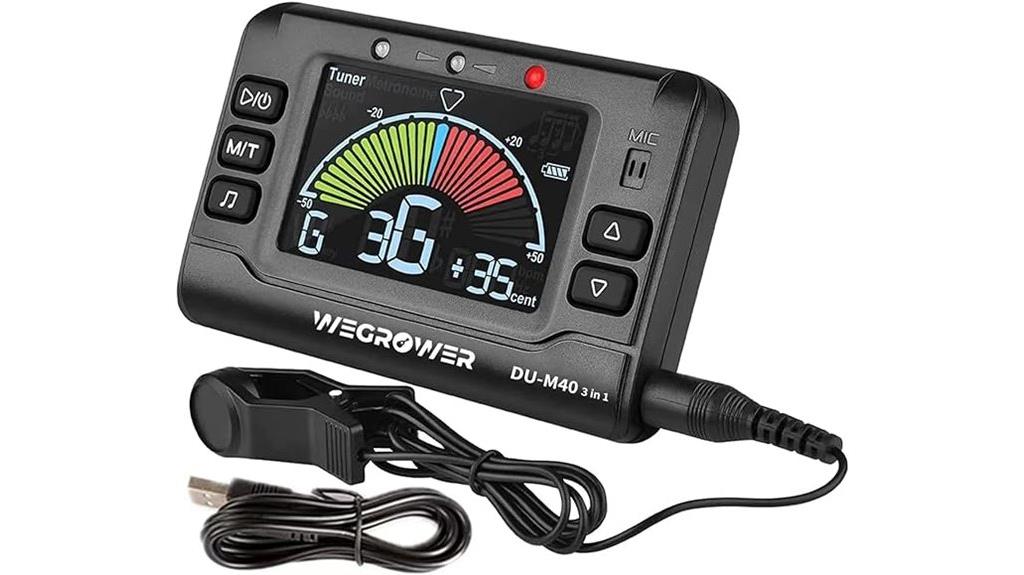
If you're a flutist looking for a reliable and versatile tuning solution, the Metronome Tuner, a 3 in 1 Digital Tuner, is an excellent choice. This rechargeable device serves as a metronome, tuner, and tone generator, making it perfect for multiple instruments. With a wide detection range and multiple tuning modes, you can easily achieve accurate tuning for your flute and more.
Its user-friendly design features a large LCD color screen and LED indicators, ensuring visibility in various environments. You'll appreciate the long battery life, allowing you to practice for hours without interruption. Although the internal speaker might be quiet, using an external speaker enhances sound output. Overall, it's a fantastic value for any musician seeking a dependable tuning aid.
Best For: Musicians seeking a reliable and versatile tuning solution for various instruments, including flutes.
Pros:
- Rechargeable battery provides long usage time, making it convenient for extended practice sessions.
- User-friendly design with a large LCD color screen and LED indicators enhances visibility in different lighting conditions.
- Versatile functionality as a metronome, tuner, and tone generator caters to a wide range of musical needs.
Cons:
- LCD screen visibility can be poor outdoors and at high tempos, which may affect usability.
- Short tuning mic cord may limit positioning options for some users.
- Quiet internal speaker may require an external speaker for better sound output during practice.
Fender FCT-2 Professional Clip-On Tuner
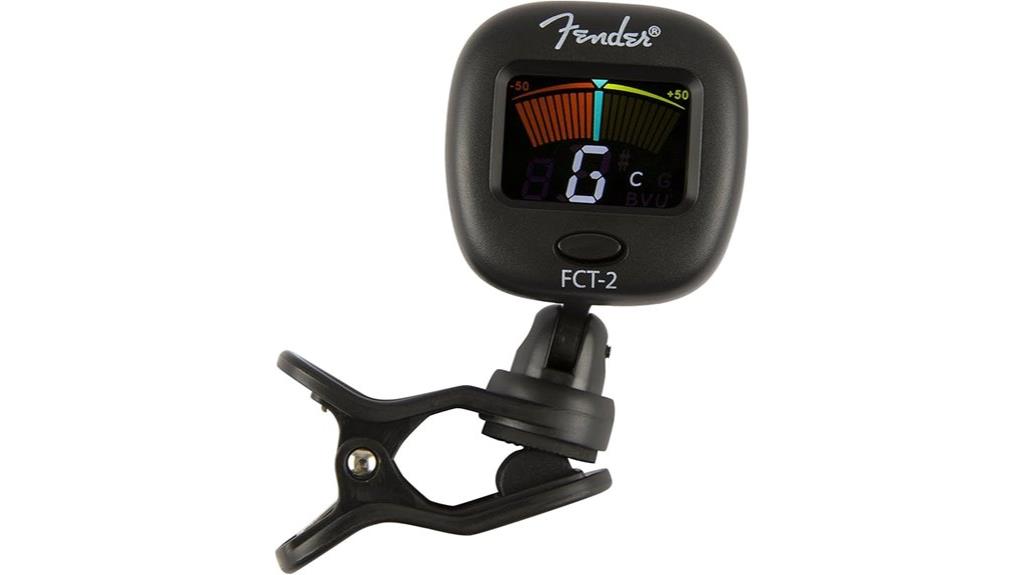
The Fender FCT-2 Professional Clip-On Tuner stands out as an ideal choice for flutists seeking reliable and accurate tuning in various settings. With its bright color LCD display, you'll easily see your tuning status, even in dark environments. This versatile tuner supports a wide range of instruments, from guitars to violins, and features a tuning range from B0 to B7 with A440 calibration. Its dual-hinge design guarantees flexible mounting on your instrument's headstock, making it user-friendly. Lightweight and compact, it's easy to carry around. Plus, you'll appreciate the long-lasting battery life and durable build, which enhance your overall experience. For quick adjustments, the FCT-2 outperforms many floor pedal tuners, making it a top pick for flutists.
Best For: The Fender FCT-2 Professional Clip-On Tuner is best for musicians who need a reliable, versatile tuner that performs well in various lighting conditions and across multiple instruments.
Pros:
- Bright color LCD display for easy visibility in dark environments.
- Compact and lightweight design makes it highly portable and user-friendly.
- Long-lasting battery life and durable build for extended use.
Cons:
- May not be specifically tailored for flutes, limiting its appeal to flutists.
- Some users might prefer a pedal tuner for stage use despite its quick adjustment capabilities.
- The dual-hinge design might not fit all headstock styles perfectly.
Snark Rechargeable Clip-On Tuner for Guitar, Bass & Violin
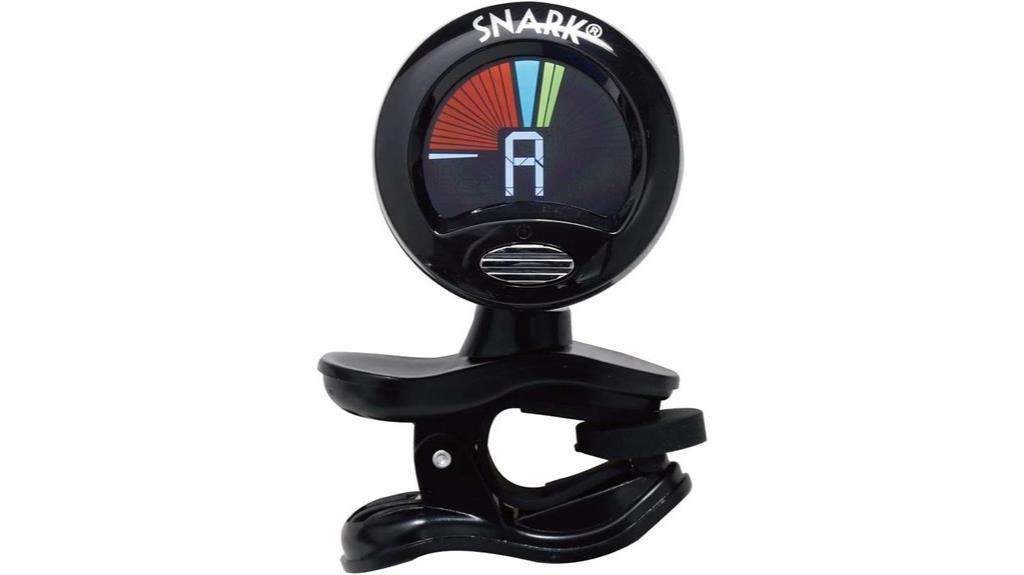
For flutists seeking a reliable and versatile tuning solution, the Snark Rechargeable Clip-On Tuner stands out with its impressive 360-degree display rotation, allowing you to position it comfortably whether you're left or right-handed. This tuner is designed for a variety of instruments, including guitars, basses, and violins, making it a great choice for multi-instrumentalists. It features a clear display that remains visible even in low light, ensuring you can tune accurately anytime. Users appreciate its simple operation—just clip it on, turn it on, and adjust. With a long battery life and durable design, the Snark tuner offers excellent value, receiving positive feedback for reliability and performance from musicians across various genres.
Best For: Musicians looking for a reliable and versatile clip-on tuner that works well across multiple instruments, including guitar, bass, and violin.
Pros:
- Clear display that is easy to read in low light conditions.
- Simple operation makes it user-friendly for musicians of all levels.
- Long battery life allows for extended use without frequent recharging.
Cons:
- Some users report concerns about durability and a delicate feel.
- Previous models had issues with rubber coating in humid conditions.
- Occasional problems with the rubber foot falling off, requiring DIY fixes.
Moreup 3 in 1 Digital Metronome Tuner Tone Generator
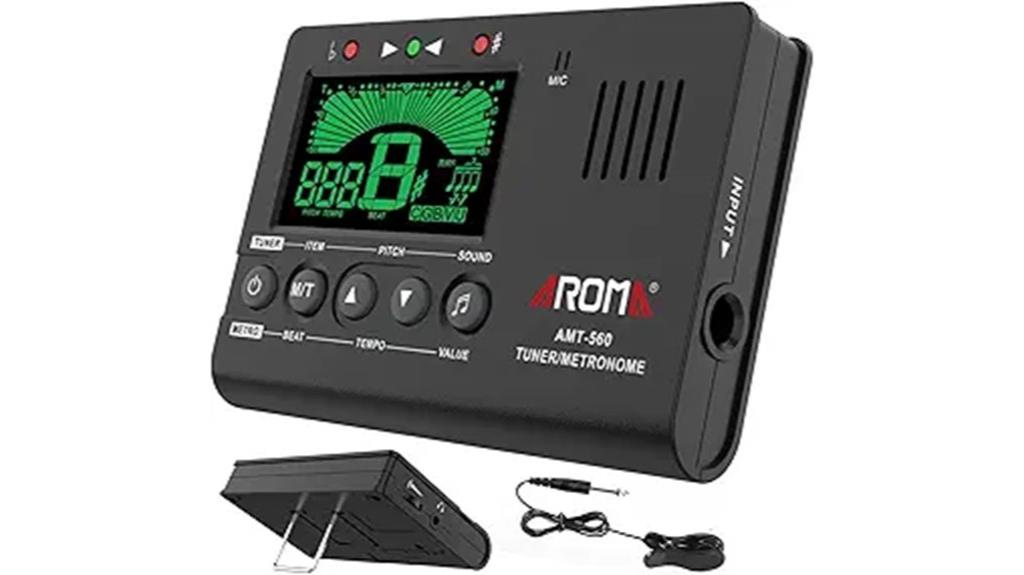
Looking for a versatile tool that caters to both beginners and seasoned musicians? The Moreup 3 in 1 Digital Metronome Tuner Tone Generator might be just what you need. This compact device combines a metronome, digital tuner, and tone generator, making it suitable for a variety of instruments, including flutes, guitars, and violins. With a tempo range of 30-260 beats per minute and eight rhythm patterns, you can easily find your groove. The tuner covers a wide frequency range, offering five tuning modes and adjustable pitch settings. Users appreciate its clear LCD screen and straightforward setup, though some mention battery dependency and sound quality issues. Overall, it's a robust choice for enhancing your musical practice sessions.
Best For: This product is best for beginners and seasoned musicians looking for an all-in-one tool to aid in practice and learning.
Pros:
- Versatile functionalities as a metronome, tuner, and tone generator.
- Compact and portable design, making it easy to carry for lessons and practice.
- Clear LCD screen and easy setup, suitable for users of all ages.
Cons:
- Dependency on batteries may be inconvenient for some users.
- Sound quality can be irritating for certain individuals.
- Lacks mechanical sound, which some musicians may prefer for rhythm clarity.
LEKATO Rechargeable 3 In 1 Digital Metronome Tuner for All Instruments
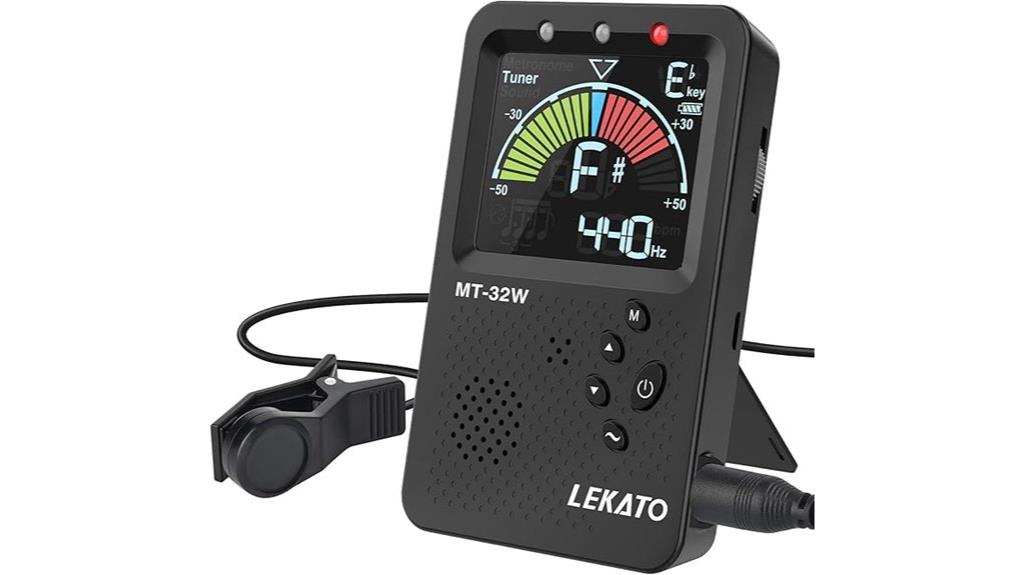
Compact and versatile, the LEKATO Rechargeable 3 In 1 Digital Metronome Tuner stands out as an excellent choice for flutists of all skill levels. This pocket-sized device combines a tuner, metronome, and tone generator, making it ideal for practice sessions. The metronome features human voice beats, a range of 30-250 beats per minute, and easy switching between time signatures, enhancing your timing skills. The tuner covers a broad range from A0 to C8, with various tuning modes that cater specifically to different instruments, including the flute. Its large LCD display and adjustable volume guarantee easy readability and sound clarity. With a rechargeable battery and long-lasting charge, you won't have to worry about constant battery replacements.
Best For: Flutists of all skill levels seeking a compact and versatile practice tool that combines tuning and metronome functions.
Pros:
- Versatile 3-in-1 functionality allows for tuning, metronome use, and tone generation.
- Large LCD display provides easy readability even in low light conditions.
- Rechargeable battery eliminates the hassle of frequent battery replacements.
Cons:
- Tuner mode lacks numerical identification for specific octaves, which may hinder precise tuning for some users.
- Instructions in the manual could be clearer for better user understanding.
- Limited customization options for metronome sounds beyond the default settings.
KLIQ MetroPitch – Metronome Tuner for All Instruments
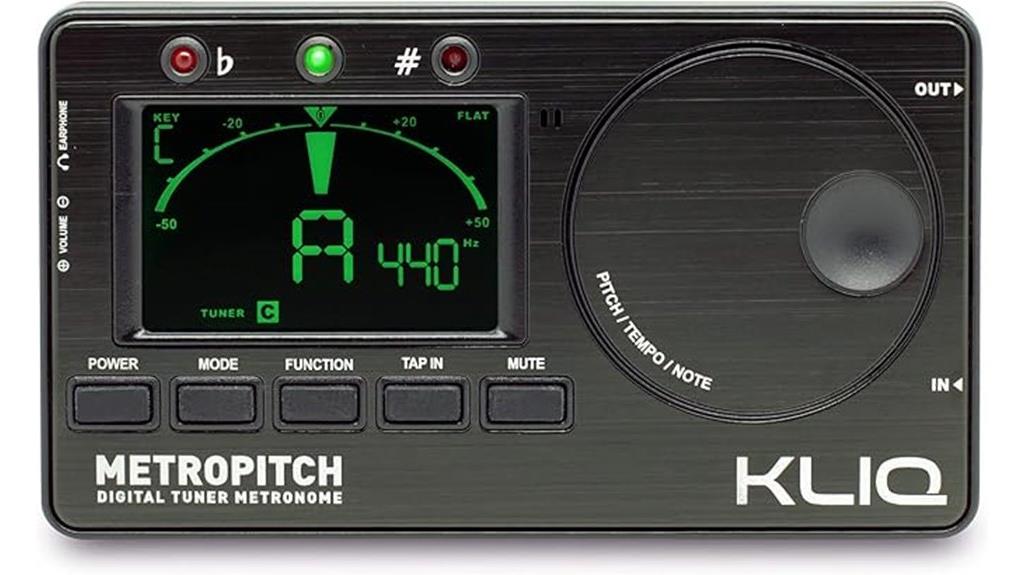
The KLIQ MetroPitch stands out as an ideal choice for flutists seeking a versatile tool that combines a tuner, metronome, and tone generator in one compact device. With a wide tuning range from A0 to C8, it accommodates multiple instruments, making it perfect for your flute and beyond. The intuitive JOG Dial allows you to adjust tempo quickly, while the high-resolution LCD screen provides clear visibility, changing from red to green when in tune. You'll appreciate the metronome's tempo range of 30-250 BPM, along with various rhythm patterns. Although some users have noted battery longevity issues, its compact design and 3-year manufacturer guarantee make the KLIQ MetroPitch a valuable addition to your musical toolkit.
Best For: The KLIQ MetroPitch is best for musicians, especially flutists, who need a multifunctional device for tuning, metronome, and tone generation.
Pros:
- Versatile functionality with tuner, metronome, and tone generator all in one device.
- Wide tuning range from A0 to C8, accommodating various instruments.
- User-friendly design featuring an intuitive JOG Dial and a high-resolution LCD screen.
Cons:
- Some users report battery longevity issues, requiring frequent replacements.
- There may be a learning curve for the pitch matching feature.
- Compact size can be a drawback for those who prefer larger, more robust devices.
Sondery Digital Metronome Tuner 3 in 1
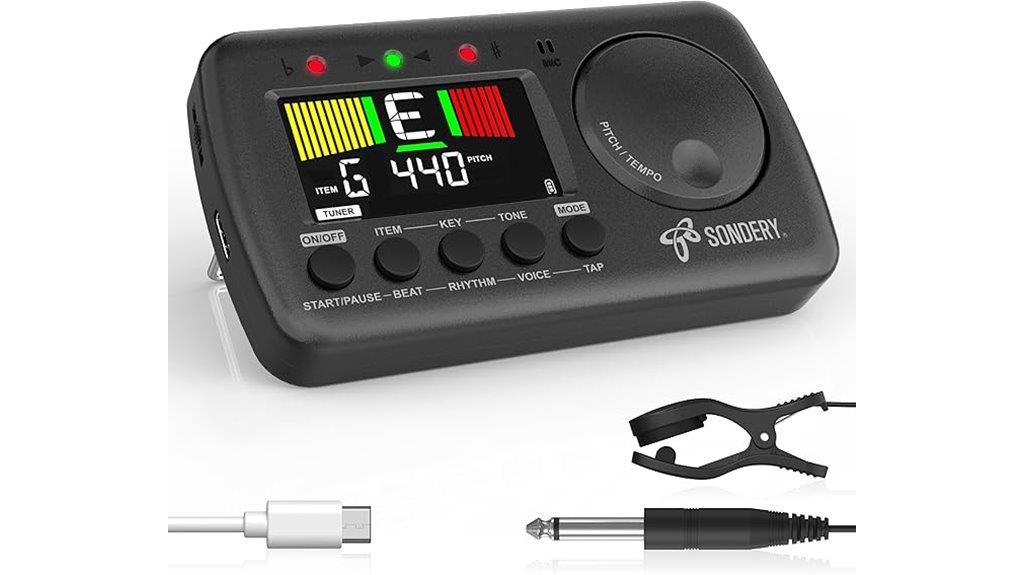
For flutists seeking a versatile tool, the Sondery Digital Metronome Tuner 3 in 1 stands out with its combination of tuner, metronome, and tone generator in a pocket-sized device. Its colorful screen and user-friendly jog dial make navigation easy, while the built-in loudspeaker and microphone guarantee accurate tuning across various instruments, including your flute. With pitch calibration from 410Hz to 450Hz and 12 tuning keys, you can fine-tune your sound effortlessly. The metronome features a broad tempo range of 30-260 BPM, providing vocal counting to enhance your timing. Although some users find it a bit complex, the long battery life and outdoor visibility make it a practical choice for lessons, studio work, or live performances.
Best For: Flutists and musicians of all levels seeking a compact and multifunctional tuning and timing device.
Pros:
- Versatile functionality as a tuner, metronome, and tone generator in one device.
- User-friendly design with a colorful screen and jog dial for easy navigation.
- Long battery life and visibility in outdoor conditions, making it suitable for various settings.
Cons:
- Some users may find the device complicated compared to simpler tuners.
- Tap tempo functionality can be difficult for some users to utilize effectively.
- May not be as intuitive for beginners unfamiliar with tuning and metronome concepts.
JOYO Clip on Digital Electronic Tuner for Guitar and Bass
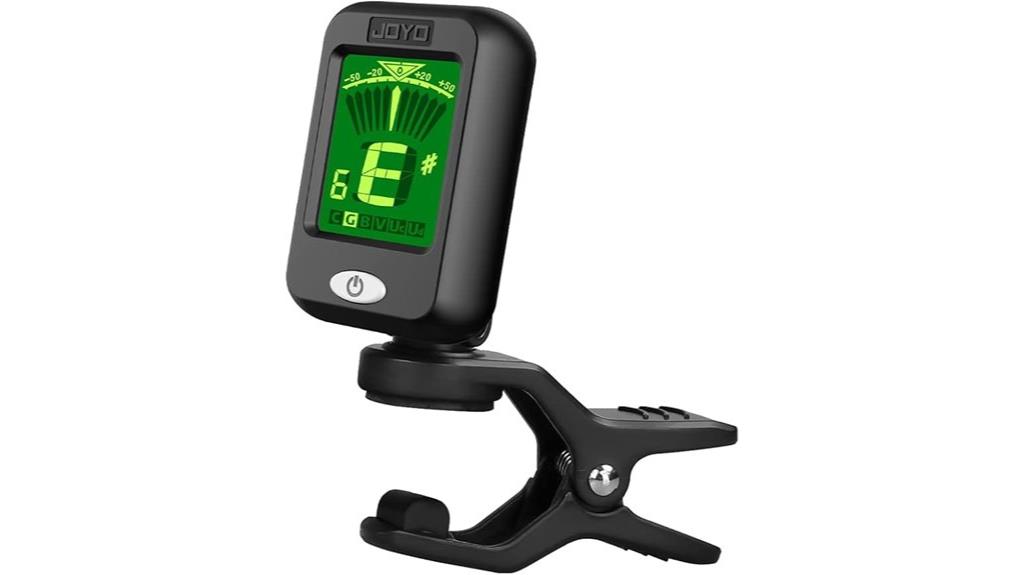
With its highly sensitive tuner and metronome mode, the JOYO Clip on Digital Electronic Tuner is an excellent choice for music teachers, professionals, and junior players alike. This compact tuner supports a wide range of instruments, including guitar, bass, ukulele, and more. Its clear LCD display makes tuning easy, while the automatic shutdown feature conserves battery life. Although it may not be as precise as higher-priced models, it performs well for most strings, with minor issues only on lower pitches. Users appreciate its portability and good value, making it a popular choice. Just keep in mind the small battery compartment screw can complicate changes. Overall, it's a reliable tuner for casual use and everyday practice.
Best For: The JOYO Clip on Digital Electronic Tuner is best for casual players, music teachers, and beginners looking for an affordable and reliable tuning solution.
Pros:
- Compact and portable design, making it easy to carry for on-the-go tuning.
- Clear LCD display for easy readability during use.
- Good value for the price, making it accessible for a wide range of users.
Cons:
- Small screw for the battery compartment can complicate battery changes.
- Limited precision on lower pitches, particularly for 5-string bass.
- Durability issues reported by some users, such as sudden failures or damage from drops.
DAddario Accessories Violin Clip-On Tuner
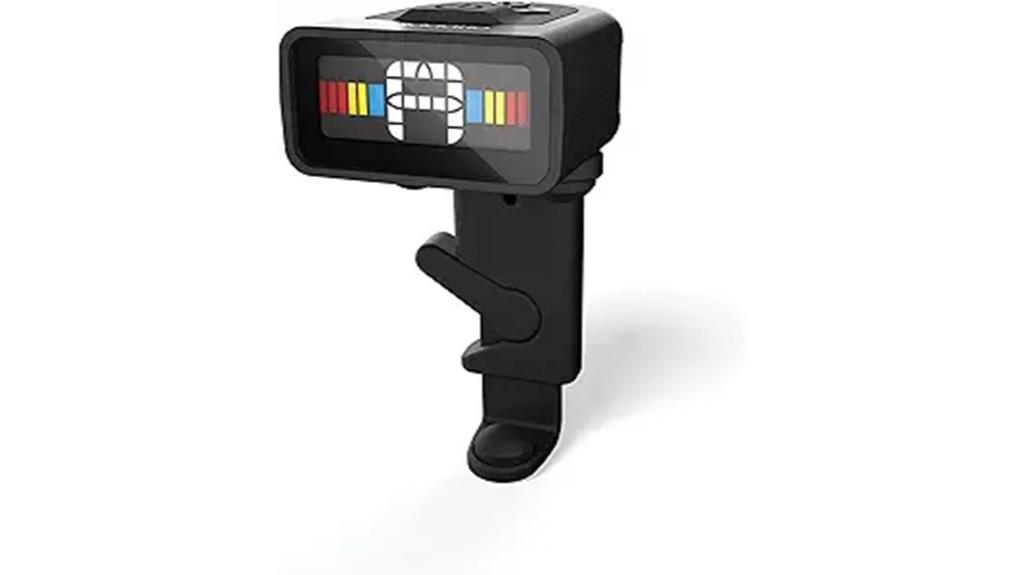
Designed specifically for violins, the DAddario Accessories Violin Clip-On Tuner offers extreme accuracy that makes it an excellent choice for beginners looking to refine their tuning skills. This clip-on tuner utilizes a piezo transducer, detecting vibrations for precise tuning within a calibration range of 410-480Hz. Its non-marring lever-lock clamp guarantees easy attachment and removal, while the tri-color reversible backlit LCD screen enhances visibility in low-light situations.
Though some users report minor issues with dislodging, the overall performance remains reliable, making it easy to read and adjust. You can keep it attached while storing your violin, allowing for convenient practice. With high ratings for accuracy and usability, this tuner is a practical investment for budding violinists.
Best For: The DAddario Accessories Violin Clip-On Tuner is best for beginner violinists seeking an accurate and easy-to-use tuning solution.
Pros:
- Highly accurate tuning with a wide calibration range of 410-480Hz.
- Non-marring lever-lock clamp allows for easy attachment and removal.
- Tri-color reversible backlit LCD screen enhances visibility, even in low-light conditions.
Cons:
- Some users experience dislodging or loss of grip during use.
- Difficulty reported in opening the battery case for replacement.
- Instructions and marketing materials could be clearer regarding operation and capabilities.
Aodsk Clip-on Guitar Tuner for String Instruments
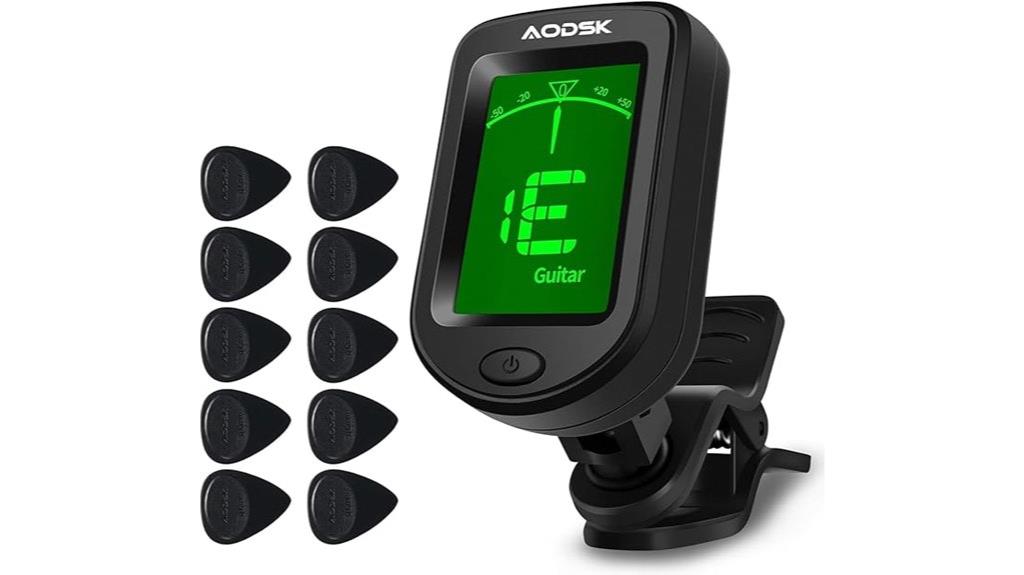
The Aodsk Clip-on Guitar Tuner stands out as a versatile choice for musicians who play a variety of string instruments, including flutes. Its digital electronic design features a large, clear LCD display that's easy to read from any angle. You'll appreciate the sturdy clip that securely attaches to your instrument, ensuring it won't slip off while you tune. With fast and accurate tuning capabilities, this tuner works well for acoustic guitars, ukuleles, and even bass guitars. While some users report mixed experiences regarding accuracy, many find it provides great value for the price. Plus, it comes with 10 guitar picks, making it an excellent gift for music lovers without breaking the bank.
Best For: Musicians looking for an affordable, versatile tuner suitable for a variety of string instruments, including guitars, ukuleles, and basses.
Pros:
- Pro: Large, clear LCD display for easy reading from multiple angles.
- Pro: Sturdy clip design ensures secure attachment to various instruments.
- Pro: Affordable price point makes it a great value and an ideal gift for music lovers.
Cons:
- Con: Some users report inconsistent accuracy and slow response times.
- Con: Performance may not match that of more expensive tuners for professional use.
- Con: Mixed reviews on sensitivity, with some finding it less responsive than expected.
Factors to Consider When Choosing Digital Tuners for Flutes
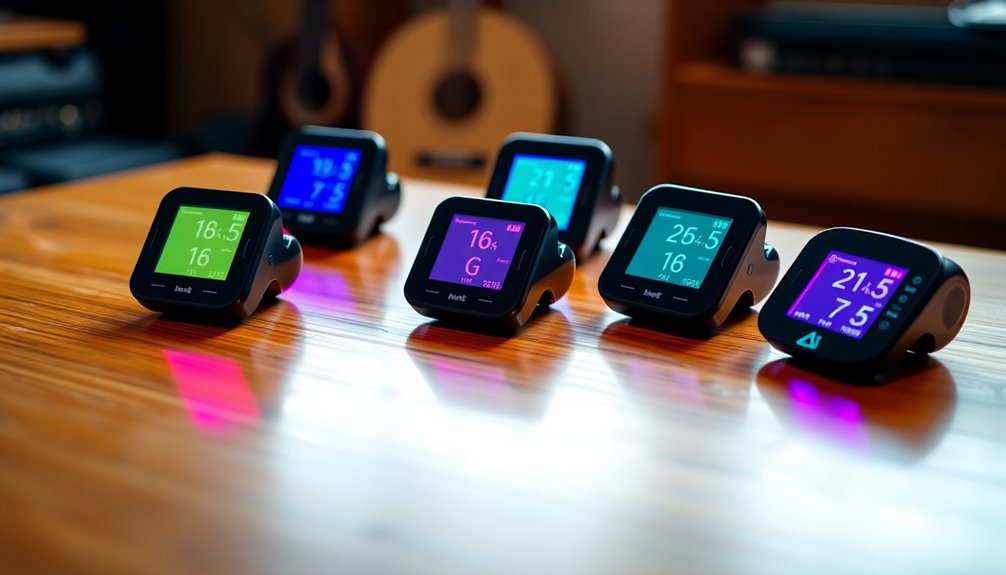
When you're picking a digital tuner for your flute, there are several key factors to keep in mind. You'll want to contemplate the tuning range versatility, display visibility quality, and battery life, among other things. Additionally, think about how accurate and sensitive the tuner is, as well as its portability and design to suit your needs.
Tuning Range Versatility
In your search for the best digital tuner for flutes, tuning range versatility is an essential factor to take into account. You'll want a tuner that covers at least A4 (440Hz) and extends up to C8 (4186Hz) to accommodate various flute pitches. A chromatic mode is beneficial, as it can handle all twelve pitches of the chromatic scale, guaranteeing accurate tuning for flutes in different keys.
Consider tuners that offer pitch calibration options, typically ranging from 430Hz to 450Hz. This feature allows you to make necessary adjustments for different musical contexts and ensembles, enhancing your versatility as a flutist. Additionally, a wide frequency detection range guarantees that the tuner can accurately handle both lower and higher notes produced by various flute types.
Lastly, while tuning range is critical, don't overlook the importance of a visual display that indicates tuning accuracy. This will assist you in achieving precise pitch alignment, especially since the flute requires exact tuning to sound its best. By prioritizing these features, you'll find a digital tuner that not only meets your needs but also elevates your performance.
Display Visibility Quality
Finding the right digital tuner for your flute isn't just about features; display visibility quality plays an essential role, too. A clear and bright screen is vital, especially when you're in varying lighting conditions. High-resolution LCD screens often come with backlighting or color indicators, making it easier for you to check your tuning status at a glance, even in low-light environments.
Adjustable display angles can also enhance your experience, allowing you to see the tuner comfortably while focusing on your instrument. This feature is invaluable during performances and practice sessions alike. The contrast levels of the display matter, too; tuners with high contrast ratios guarantee that you can read the information without straining your eyes.
Additionally, consider tuners that offer a needle-style display. This design provides immediate visual feedback, making it more intuitive for quick assessments of tuning accuracy compared to traditional digital number displays. Ultimately, choosing a digital tuner with excellent display visibility quality can greatly improve your tuning experience, assuring you stay in tune without unnecessary distractions.
Battery Life Considerations
While selecting a digital tuner for your flute, battery life is a crucial consideration that can impact your practice and performance sessions. Tuners with rechargeable batteries often provide longer usage times, so you won't have to worry about frequent replacements. Look for models that can operate for several hours on a single charge; some even last days during continuous use. This extended battery life can be a game-changer, especially during long rehearsals or performances.
Consider tuners that feature automatic shut-off functions. These can conserve battery life when the device isn't in use, greatly extending its overall longevity. Additionally, some tuners come with USB charging options, allowing you to charge them conveniently with power banks or other USB-compatible sources. This flexibility can be particularly useful when you're on the go.
Lastly, don't forget to check user reviews regarding battery performance. Insights from other musicians can give you a clearer picture of how long a tuner lasts under typical usage conditions. Prioritizing battery life will help you choose a tuner that keeps you in tune without interruptions.
Portability and Design
When choosing a digital tuner for your flute, portability and design play a significant role in your overall experience. You want a tuner that's compact and lightweight, making it easy to carry in your instrument case or even your pocket. A clip-on design is particularly beneficial, as it allows for secure attachment to your flute, ensuring it stays in place during practice or performances without getting in your way.
Consider tuners that feature a rotatable display; this lets you adjust the viewing angle for ideal visibility, regardless of the environment or lighting conditions. Some models even have a folding kickstand, providing stability on flat surfaces, which enhances usability during those practice sessions.
Durability is another key factor. You'll want a tuner constructed from sturdy materials that can withstand frequent handling and transport while maintaining functionality. A well-designed, portable tuner not only makes tuning your flute more convenient but also enhances your overall playing experience. By focusing on these aspects, you can find a digital tuner that fits seamlessly into your musical journey.
Accuracy and Sensitivity
For ideal tuning of your flute, accuracy and sensitivity are vital factors to take into account in a digital tuner. Look for models with a wide frequency range, ideally from A0 to C8, so you can accommodate the full spectrum of flute pitches. A tuner with a sensitivity of ±0.5 cent is desirable, as it guarantees you can detect even the most subtle pitch variations, keeping your performance precise.
Additionally, choose a tuner that features a reliable microphone or pickup system. Flute sounds can be softer than those of other instruments, so having a tuner that effectively captures your sound is essential.
Consider tuners that offer various tuning modes, like chromatic options and specific presets for flutes. This flexibility allows quick and accurate adjustments, making your tuning process smoother.
Lastly, pay attention to the display. A bright LCD with backlighting enhances visibility, especially in low-light environments. This feature makes it easier for you to read tuning indicators during practice or performances, guaranteeing your flute is always in perfect pitch.
Instrument Compatibility
Choosing the right digital tuner for your flute goes beyond just accuracy and sensitivity; instrument compatibility plays a significant role in guaranteeing peak performance. Start by selecting a tuner that supports a wide tuning range, ideally from B3 to C7. This range accommodates the typical notes played by flutes, allowing you to fine-tune your instrument effectively.
Look for tuners with chromatic tuning modes, which provide the flexibility you need to tune across various keys and pitches. Since the sound of a flute is often softer than that of string instruments, make certain the tuner features a high sensitivity microphone or contact pickup to accurately detect your flute's sound.
Additionally, consider a tuner that offers adjustable pitch calibration. This feature helps you match your flute's tuning to specific ensemble requirements, such as A440 or other pitch standards. Finally, don't overlook the display visibility and usability in different lighting conditions. Flutes are frequently played in various environments, including dimly lit settings, so having a tuner that remains easy to read is essential for your performance.
User-Friendly Features
A tuner's user-friendly features can greatly enhance your tuning experience, making it easier to achieve precise pitch with your flute. First, look for a tuner with a large, clear LCD display. This is vital for visibility, especially in darker settings where you might be playing. You want to make certain you can easily read the tuning indicators.
Next, consider tuners that offer a wide tuning range, such as A0-C8. This versatility is fundamental for covering the full spectrum of flute pitches, guaranteeing you can tune every note accurately. Multiple tuning modes, including chromatic options, also provide flexibility depending on your playing style and preferences.
Additionally, features like adjustable volume control and headphone output are advantageous for private practice sessions. These allow you to tune discreetly without disturbing others around you. Finally, opt for tuners that boast quick and intuitive operation. Simple clip-on designs and one-touch functionality can greatly streamline the tuning process, making it easier for you to focus on your performance. By prioritizing these user-friendly features, you can enhance both your practice and performance with your flute.
Price and Value
Price plays an essential role in selecting the right digital tuner for your flute, as it can greatly impact your overall experience. You'll find entry-level tuners starting around $10 to $30, while professional-grade models can set you back $50 or more. It's vital to assess the value each tuner offers. Look for features like accuracy, display quality, and versatility for tuning different instruments, as these can justify a higher price tag.
Consider tuners with rechargeable battery options, which save you money over time compared to those needing frequent battery replacements. Additionally, don't overlook warranty and customer support services. Products with longer warranties often indicate higher quality and better value for your investment.
Lastly, it's wise to compare user reviews and ratings to identify tuners that deliver reliable performance across various price points. This way, you can guarantee you're getting the best value for your budget, allowing you to focus on honing your skills rather than worrying about your tuner. By carefully weighing price and value, you'll find a digital tuner that meets your needs without breaking the bank.
Frequently Asked Questions
Can Digital Tuners Be Used for Other Instruments Besides Flutes?
Absolutely, digital tuners can be used for a variety of instruments beyond flutes! Whether you play guitar, violin, or even brass instruments, these tuners are versatile tools that help you achieve accurate pitch. They often feature various tuning modes to accommodate different instruments, making tuning quick and straightforward. Just clip it on or set it near your instrument, and you'll be ready to tune up your performance, no matter what you're playing!
How Do I Calibrate My Digital Tuner for Accurate Readings?
To calibrate your digital tuner, imagine a serene forest, where every note floats perfectly in the air. Start by accessing the tuner's settings menu. Adjust the pitch reference, usually set to 440 Hz, to match your instrument's standard. Play a reference note, and watch the display. You'll see a needle or light guiding you. Fine-tune until the reading centers perfectly. You're ready to create harmonious melodies, ensuring every performance resonates beautifully!
Are There Any Digital Tuners Specifically Designed for Beginners?
Yes, there are digital tuners specifically designed for beginners. These tuners often feature simple interfaces and clear displays, making it easy for you to read the notes and find the right pitch. Some even have built-in metronomes to help you keep time. When you're starting out, look for tuners that offer visual cues, like color changes, to indicate whether you're in tune. This way, you can build your skills confidently and effectively.
What Features Should I Prioritize in a Flute Tuner?
When you're choosing a flute tuner, prioritize accuracy and ease of use. Look for a tuner that offers a clear display and visual indicators, so you can quickly see your pitch. A tuner with a microphone sensitivity feature is essential, as it'll pick up your flute's sound effectively. Additionally, consider one that has a wide tuning range and multiple modes, like chromatic and concert pitch, to suit your playing needs.
How Often Should I Tune My Flute Using a Digital Tuner?
Imagine your flute as a garden. Just as flowers need regular care, your flute needs tuning to thrive. You should tune your flute every time you play, especially if you've transported it or the temperature's changed. This keeps your sound fresh and vibrant, like blooming petals. Regular tuning not only guarantees accuracy but also helps you build a deeper connection with your instrument, allowing your musical expression to flourish beautifully.
Conclusion
As you commence your musical journey, imagine the sweet, soaring notes of your flute resonating in perfect harmony. Choosing the right digital tuner can be the key to revealing that enchanting sound. With our top picks, you'll find a reliable companion that fine-tunes your performance, ensuring every note shines. So, grab one of these tuners, and let your melodies dance through the air, engaging every listener with their clarity and precision. Happy playing!

